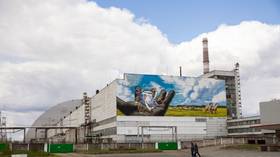IAEA comments on Chernobyl safety fears

The International Atomic Energy Agency said on Wednesday that a power cut at the Chernobyl nuclear plant does not present a “critical” threat. Earlier, the Ukrainian authorities accused Russia of “making radiation leaks imminent.”
Ukraine’s nuclear energy firm, Energoatom, warned on Wednesday morning that communications had been lost with the Chernobyl plant, and that the facility “was fully disconnected from the power grid.” With Russian troops operating in the area, the company said that repair workers could not get to the plant to restore power.
Ukrainian Foreign Minister Dmytro Kuleba declared that once the plant’s backup diesel generators run out, “cooling systems of the storage facility for spent nuclear fuel will stop, making radiation leaks imminent.”
Reserve diesel generators have a 48-hour capacity to power the Chornobyl NPP. After that, cooling systems of the storage facility for spent nuclear fuel will stop, making radiation leaks imminent. Putin’s barbaric war puts entire Europe in danger. He must stop it immediately! 2/2
— Dmytro Kuleba (@DmytroKuleba) March 9, 2022
However, the International Atomic Energy Agency was calmer in its assessment of the situation. In a press release on Wednesday afternoon, the agency said that there is currently “no critical impact on safety.”
“Due to time elapsed since the 1986 Chornobyl accident, the heat load of the spent fuel storage pool and the volume of cooling water contained in the pool is sufficient to maintain effective heat removal without the need for electrical supply,” the IAEA had said in an earlier update.
#Ukraine has informed IAEA of power loss at #Chornobyl Nuclear Power Plant, @rafaelmgrossi says development violates key safety pillar on ensuring uninterrupted power supply; in this case IAEA sees no critical impact on safety.
— IAEA - International Atomic Energy Agency (@iaeaorg) March 9, 2022
Chernobyl is the site of the world’s worst nuclear disaster. A routine test gone awry on April 26, 1986 led to the meltdown of the plant’s Number 4 reactor, exposing those living nearby to hazardous levels of radiation and rendering large areas surrounding the plant uninhabitable to this day. Although no longer functioning, Chernobyl still requires constant upkeep to avoid another accident.
“I remain gravely concerned about the deteriorating situation in Ukraine, especially about the country’s nuclear power plants, which must be able to continue operating without any safety or security threats,” said IAEA Director General Rafael Mariano Grossi. “Any accident caused as a result of the military conflict could have extremely serious consequences for people and the environment, in Ukraine and beyond.”
Ukrainian officials have repeatedly attempted to draw Western support by highlighting the apparent danger to the country’s nuclear plants. When Russian troops first arrived at the plant, Ukrainian President Volodymyr Zelensky accused them of issuing “a declaration of war against the whole of Europe.” Likewise, when Russian troops engaged Ukrainian soldiers at the Zaporozhskaya nuclear facility, Zelensky accused Moscow of “nuclear terrorism.” However, damage on the grounds of the plant – whose reactors are safely encased in concrete – was quickly repaired and Energoatom says that radiation levels there are normal.












